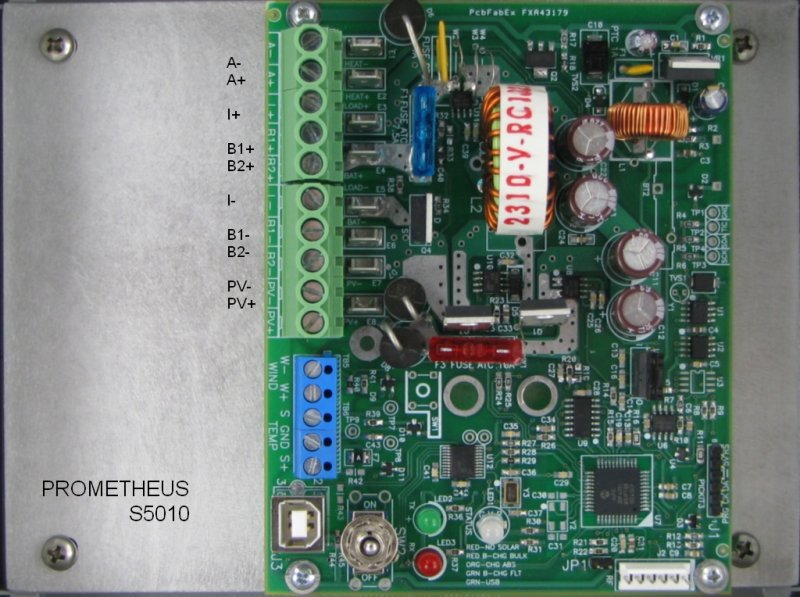Welcome to Daedalus Devices
Home of clever devices for green energy solutions
Marine, Sealed
Coming Soon |
Prometheus
MPPT Solar Charge Controller
Open Frame |
Prometheus
MPPT Solar Charge Controller
Nema 4X Enclosure |
Weather Station
Coming Soon |
Prometheus Solar MPPT Charge Controller
12V 16V 24V Volt System Configuration
MPPT Solar Charge Controller with intelligence
The Prometheus series is a new generation of micro solar MPPT charge controllers.
They bring a wealth of new versatility and features not yet seen in one product on
the market today.
The Prometheus series is designed to be a scalable, efficient solution that
allows you to expand your solar power system over time while minimizing initial
costs.
The Prometheus series includes an MPPT, which is essential in any system where maximum
energy collection is needed. A system without an MPPT will collect only a fraction
of the power.
Below you will find a listing of many of the features that the Prometheus series
brings to your power system at an affordable price.

Prometheus Model S5010
Main Feature List
- Tri-Color LED show current state of system (including Batteries)
- Flexible Solar Panel Voltage range, 8-50V (Automatically Maximizes efficiency with MPPT)
- Scalable system just add units in parallel
- Retrieve data logs via USB interface
- Data storage, 1024 Kb, 10 Year retention
- Configure, set log events and thresholds via USB interface
- Microprocessor based
- Night light function
- Record over 200 data events per day for a year
- MPPT (Maximum Power Point Tracking)
- Battery technologies Flooded, AGM, Gel
- Scheduled activation using RTCC (Real-Time Clock / Calendar) chip
- Auto-recovery disconnection / reconnection with hysteresis
- Software-configurable battery protection (Defaults)
- Deep-discharge protection 30% SOC : LVD 11.2V / 14.93 / 22.2V
- Reconnection voltage protection 50% SOC: LVD 12.6V / 16.80 / 25.2V
- Full charge voltage @ 25C: 13.9V /18.53V / 27.8V Max.
- Charging voltage @ 25C: 14.7V / 19.6V / 28.9V Max.
- Day / Night - Dawn / Dusk Sensor (via solar panel voltage)
- Anemometer input
LED Status Indicators
- Red - no solar power)
- Red blinking - charging bulk mode 70% SOC)
- Orange - charging absorption mode 85 SOC but 70%)
- Orange blinking - charge state (1 blink for full, 2 for ~75%, 3 for ~50%))
- Green blinking - charging float mode 85% SOC)
- Green - USB mode (Data retrieval / Software configuration))
- Off - serious error condition (No Battery / Power)
Data Logging
- Logging of Solar Voltage, Current and Calculated power
- Logging of Battery Voltage, Current and Calculated power
- Logging of Wind speed (with optional anemometer, m/s)v
- Logging of Temperature (with optional temperature sensor)
- Data retention of 10 years without power
- Data retrieved via USB by default
Device Event Control
- Control of two independent electric switches
- Switches can be triggered by
- Time / Date
- Day / Night - Dawn / Dusk - optional delay
- State of charge (SOC)
- Temperature * (must have temperature sensor)
- Wind Speed * (must have anemometer)
- Primary Switch is limited to 10 Amps (Low Side Ground switch)
- Secondary Switch is limited to 4 Amps (Low side Ground switch)
- Switched voltage will match state of batteries (12v bat, 12v switched)
Ratings
- Solar panel Open circuit voltage 50V Maximum
- Solar panel input current is 10A Maximum
- System Maximum Power Configuration
- 12V, 14.7V @ 10A, 147W (Qty 1 12V batteries))
- 16V, 19.2V @ 10A, 192W (Qty 2 8V batteries))
- 24V, 29.4V @ 10A, 294W (Qty 2 12V batteries or 3 8V)
- Safety features include fusing (15A battery, 10A solar panel)
- Self consumption: < 0.25 W
- Physical features
- Enclosure Rating: Nema 4X )
- Enclosure size: 6" x 8" x 3")
- Weight: 1.1 lbs)
- Operating temperature: -30 to +55C (-22 to +131F)
- Warranty: up to 1 year
Optional features
- Wireless data retrieval
- Mechanical Override Switch for primary device
- Motion Sensor
- Temperature Sensor
- Extra Data storage (64Kb)
- Alarm: Horn
- Cold Weather Power Pak (allows weather station function in extreme cold )
Read our Frequently Asked Questions (FAQ)

